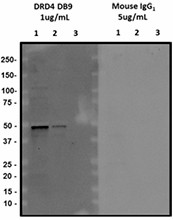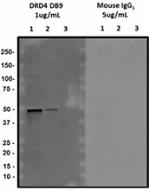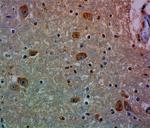- Clone
- 2B9/DRD4 (See other available formats)
- Regulatory Status
- RUO
- Other Names
- DRD4, Dopamine D4 receptor
- Isotype
- Mouse IgG1, κ
- Ave. Rating
- Submit a Review
- Product Citations
- publications

-

Western blot of anti-Dopamine Receptor D4 antibody (clone 2B9/DRD4) or mouse IgG1 isotype control. Lane 1: 20 µg of human brain lysate; Lane 2: 20 µg of mouse brain lysate; Lane 3: 10 ng of recombinant human DRD1 protein. Blots were incubated with 1 µg/ml of primary antibody or 5 µg/ml of mouse IgG1 overnight at 4°C, followed by incubation with HRP labeled goat anti-mouse secondary antibody. Enhanced chemiluminescence was used as the detection system. -

IHC staining of anti-Dopamine Receptor D4 antibody (clone 2B9/DRD4) on Substantia Nigra of formalin-fixed paraffin-embedded human Parkinson’s disease brain tissue. Following antigen retrieval using Sodium Citrate H.I.E.R, the tissue was incubated with the primary antibody at 5 µg/ml overnight at 4°C. BioLegend’s Ultra-Streptavidin (USA) HRP kit (Multi-Species, DAB) was used for detection followed by hematoxylin counterstaining, according to the protocol provided.
| Cat # | Size | Price | Save |
|---|---|---|---|
| 850101 | 25 µg | ¥29,920 | |
| 850102 | 100 µg | ¥76,340 |
Dopamine Receptor D4 (DRD4) is a G-protein coupled receptor which inhibits adenyl cyclase activity. It is linked to many neurological and psychiatric conditions including schizophrenia and bipolar disorder, addictive behaviors, Parkinson’s disease, and eating disorders such as anorexia nervosa. DRD4 mutations have been associated with various behavioral phenotypes, including autonomic nervous system dysfunction, attention deficit/hyperactivity disorder, and the personality trait of novelty seeking.
Product DetailsProduct Details
- Verified Reactivity
- Human, Mouse
- Antibody Type
- Monoclonal
- Host Species
- Mouse
- Immunogen
- A peptide corresponding to the 3rd extracellular domain of DRD4 (a.a. 176-185).
- Formulation
- Phosphate-buffered solution, pH 7.2, containing 0.09% sodium azide.
- Preparation
- The antibody was purified by affinity chromatography.
- Concentration
- 0.5 mg/ml
- Storage & Handling
- The antibody solution should be stored undiluted between 2°C and 8°C.
- Application
-
WB - Quality tested
IHC-P - Verified - Recommended Usage
-
Each lot of this antibody is quality control tested by Western blotting. For Western blotting, the suggested use of this reagent is 1.0 - 5.0 µg per ml. For immunohistochemical staining on formalin-fixed paraffin-embedded tissue sections, the suggested use of this reagent is 5.0 µg per ml. It is recommended that the reagent be titrated for optimal performance for each application.
- Application Notes
-
IHC result in mouse is much weaker than in human at 5 µg/mL.
This antibody does not cross react with DRD1 in Western Blot. -
Application References
(PubMed link indicates BioLegend citation) -
- Wolstencroft EC, et al. 2007. J. Mol. Histol. 38(4):333. (WB, IF)
- Product Citations
-
- RRID
-
AB_2715868 (BioLegend Cat. No. 850101)
AB_2715869 (BioLegend Cat. No. 850102)
Antigen Details
- Structure
- Dopamine Receptor D4 is a 467 amino acids protein with a molecular mass of ~48 kD.
- Distribution
-
Tissue distribution: Mainly in the Central Nervous System. Highly expressed in Retina.
Cellular distribution: Mainly at plasma membrane. - Function
- DRD4 is activated by the neurotransmitter dopamine. It is responsible for neuronal signaling in the mesolimbic system. DRD4 inhibits adenylyl cyclase, and has been reported to modulate the circadian rhythm of contrast sensitivity via modulating the rhythmic expression of NPAS2 in the retinal ganglion cells.
- Interaction
- DRD4 forms homo- and hetero-oligomers with Dopamine Receptor D2, which may modulate agonist-induced downstream signaling. DRD4 may also interact with ADORA2A and KLHL12.
- Ligand/Receptor
- Dopamine.
- Cell Type
- Dopaminergic Neurons
- Biology Area
- Cell Biology, Neuroscience, Neuroscience Cell Markers, Synaptic Biology
- Molecular Family
- GPCR, Postsynaptic proteins
- Antigen References
-
1. Pappa I, et al. 2015. Neurosci. Biobehav. Rev. 57:175.
2. Yildirim BO, Derksen JJ. 2015. Psychiatry Res. 229(3):633-77. - Gene ID
- 1815 View all products for this Gene ID
- UniProt
- View information about Dopamine Receptor D4 on UniProt.org
Related Pages & Pathways
Pages
Other Formats
View All Dopamine Receptor D4 Reagents Request Custom Conjugation| Description | Clone | Applications |
|---|---|---|
| Purified anti-Dopamine Receptor D4 | 2B9/DRD4 | WB,IHC-P |
Compare Data Across All Formats
This data display is provided for general comparisons between formats.
Your actual data may vary due to variations in samples, target cells, instruments and their settings, staining conditions, and other factors.
If you need assistance with selecting the best format contact our expert technical support team.
-
Purified anti-Dopamine Receptor D4

Western blot of anti-Dopamine Receptor D4 antibody (clone 2B... 
IHC staining of anti-Dopamine Receptor D4 antibody (clone 2B...







Follow Us